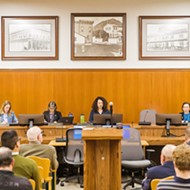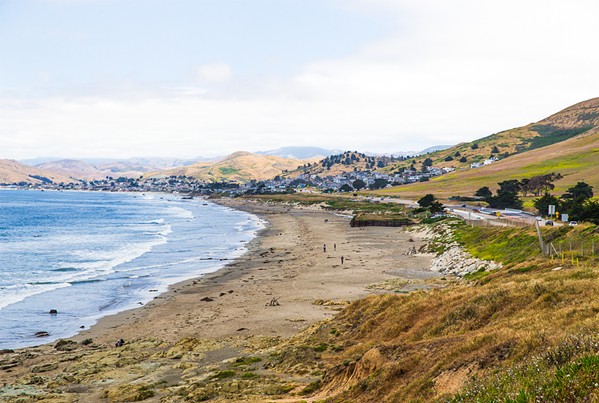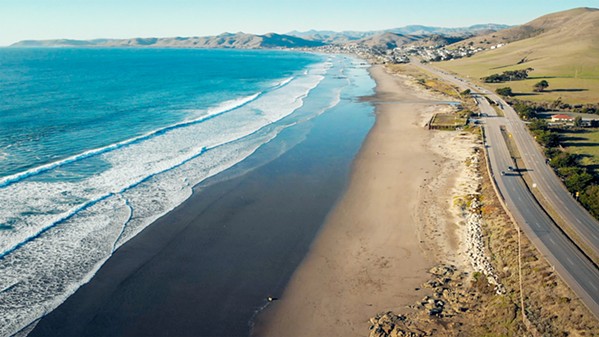Connecting communities: Amid opposition and a lawsuit, the Coastal Commission approved a paved 1.25-mile trail between Morro Bay and Cayucos
By Libbey Hanson[
{
"name": "Newsletter Promo",
"id": "NewsletterPromo",
"class": "inlineCenter",
"insertPoint": "4",
"component": "15264767",
"requiredCountToDisplay": "0"
},
{
"name": "Ad - Medium Rectangle CC01 - 300x250 - Inline Content",
"class": "inlineCenter",
"insertPoint": "8",
"component": "15582119",
"requiredCountToDisplay": "12"
},{
"name": "Ad - Medium Rectangle LC01 - 300x250 - Inline Content",
"class": "inlineCenter",
"insertPoint": "18",
"component": "15582122",
"requiredCountToDisplay": "22"
},{
"name": "Ad - Medium Rectangle 9 - 300x250 - Inline Content",
"class": "inlineCenter",
"insertPoint": "28",
"component": "15582121",
"requiredCountToDisplay": "32"
}]
Despite public concern and an ongoing lawsuit, the California Coastal Commission recently approved construction of a connector trail from Morro Bay to Cayucos.
The newly approved trail has been in the works for at least two decades and will fill a 1.25-mile gap in the already existing California Coastal Trail along Highway 1, providing a 12-foot-wide paved trail for the public to walk and bike on.
The State Coastal Conservancy told the commission via public comment letter that it has supported the project since it first funded an environmental analysis 20 years ago.
"It's been a high priority project for us and for the county," conservancy Coastal Trail Program Coordinator Tim Duffy told New Times.
SLO County Park Planner Elizabeth Kavanaugh has spearheaded the Morro Bay-Cayucos connecting trail project for the past 12 years and said the commission's June 13 decision felt like a big milestone.
"It's just a long, tedious process," she told New Times. "It's one of the hardest things I've ever done in my life."
Commissioner Linda Escalante was one of two commissioners who voted against the project at the June 13 meeting.
Escalante told New Times that despite her love for transportation as a means of community connection, she felt her own principles fighting with one another throughout the hearing.
"It was sort of my first time I've ever felt that direct conflict," she said.
She said the potential of losing the beach between the two towns is possible if the trail needs extra protection and becomes too walled or armored.
"That's a very high price for coastal access," she said.
While the project seemed like the best solution at this point in time, Escalante said she also had reservations about the environmental impacts and wanted her vote to reflect the concerns of the community.
"This is a delicate touch point that we need to think about more in advance," she said. "I need to be a little bit more thoughtful and dig more into it."
The North Point Morro Bay Homeowners Association filed a lawsuit in December 2023 against the Coastal Commission regarding the trail's planned construction on Torro Lane before the project was even approved.
Residents along Torro Lane claim the original proposed project didn't include using Torro Lane and believe the new trail will convert their current public access easement into a public throughway. According to the official complaint, they claimed this was decided without discussion or receiving their permission.
Represented by attorney Babak Naficy, the homeowners association said in a public comment letter that it supports the trail but "is opposed to the presently proposed trail configuration because it violates their well-established property rights, including the right to access their residence without substantial interference from bicyclists."
The lawsuit is currently in process and isn't scheduled for a court hearing until July 11.
County Park Planner Kavanaugh said that despite the lawsuit, the project will continue to march forward.
"We will have to see where this goes," Kavanaugh said.
Cayucos Advisory Council member Rachel Wilson spoke in favor of the trail at the June 13 meeting and said it will increase access to the coastline and help bikers travel more safely throughout the community. Currently, bicyclists along that stretch of coastline have to ride along Highway 1 next to high-speed traffic.
Susan Dunn of South Cayucos said the trail is a great idea, but on the wrong side of the highway. She added that she wasn't in favor of placing asphalt on top of the coastal bluffs above the beach.
To protect the trail, construction will include a 600-foot seawall on the south side of the trail, which some public speakers did not approve of.
Kavanaugh said the county recognized the concern, but also determined a seawall to be the least disruptive option over, for example, a trail barrier.
"The barrier would have been required to keep the bike-pedestrian users safe, but it would have hindered that view and so that was not acceptable to the community," she said.
Kavanaugh also said the county will design seawalls to fit in with the landscape, modeling sand dunes as opposed to brick walls to create a more natural, less-obvious look.
Additionally, the commission approved the project with the condition that the county will complete habitat restoration on nine acres of sand dunes to alleviate the trail's environmental impact on the surrounding area.
Before the commission review, SLO County Parks first had to obtain the land for the trail, then receive the appropriate funding to complete the project.
According to previous New Times reporting, the Cayucos Land Conservancy acquired 2,500 acres of land between Morro Bay and Cayucos from Chevron to establish space for hiking, other recreational activities, and trail access to the beach, as well as lay down a foundation for the connector trail.
New Times also reported that the county received a grant from the California Transportation Commission in 2022 totaling $7.4 million to build the trail after completing previous environmental impact reports and federal environmental review processes.
According to Kavanaugh, the project is required to start within the next two years to meet the stipulations of the grant. Construction is anticipated to start around the summer of 2025 and go into mid-2026.
Additional next steps include obtaining permits from state agencies such as the Department of Fish and Wildlife and the State Water Quality Control Board, Kavanaugh said. Δ
Reach Staff Writer Libbey Hanson at [email protected].
Correction: This story was updated to fix a typo about the width of the trail. The paved trail will be a 12 feet wide.
Latest in News
Readers also liked…
-

When the levee breaks: Oceano residents, county officials walk a tightrope of regulations to manage Arroyo Grande Creek, which some say led to the levee's failure in January
May 18, 2023 -

Cal Poly report highlights offshore wind's potential to spur green energy transition
Jun 8, 2023 -

Cal Poly students demand rent control, accountability for substandard housing from SLO City Council
Jun 22, 2023










